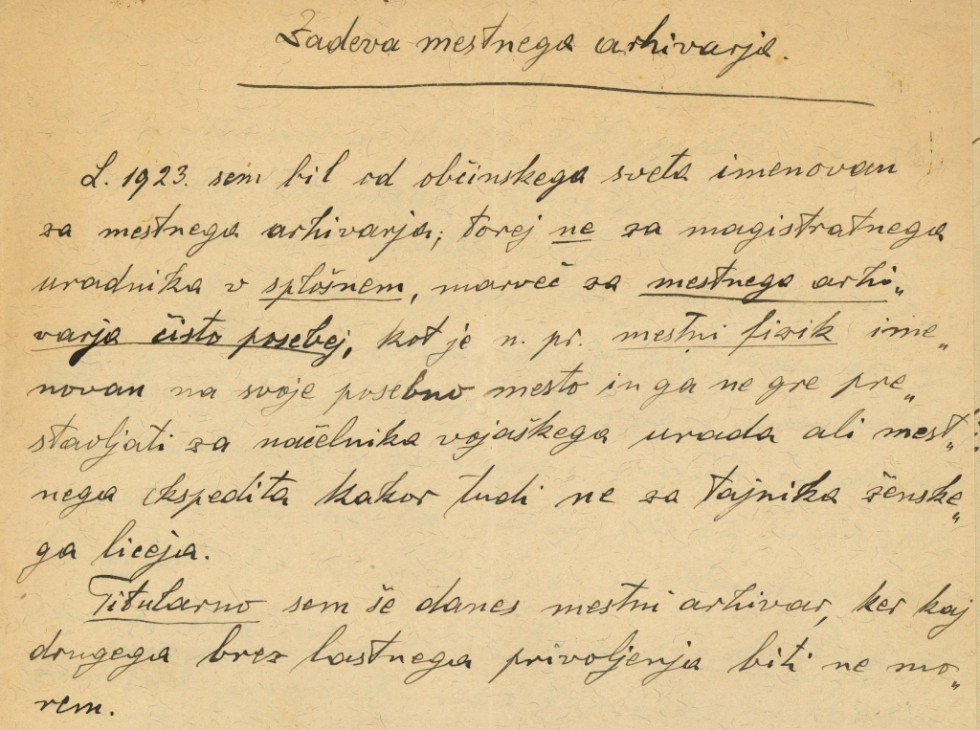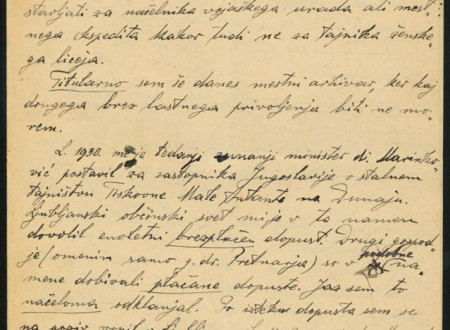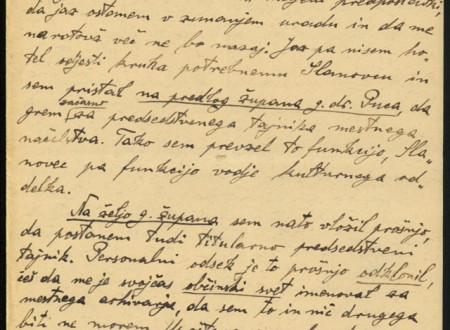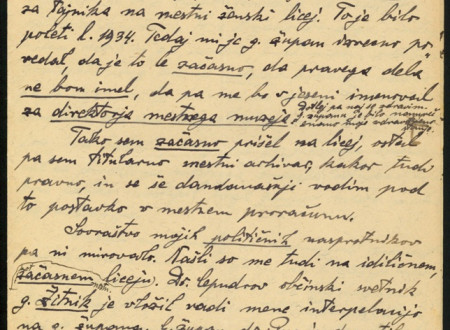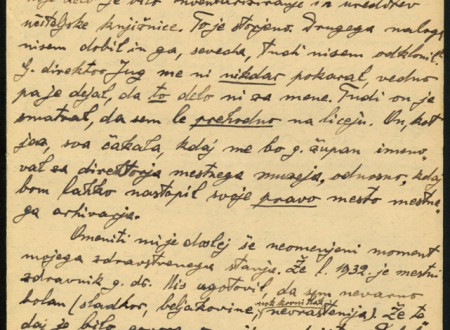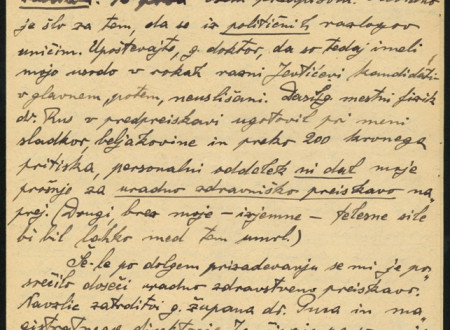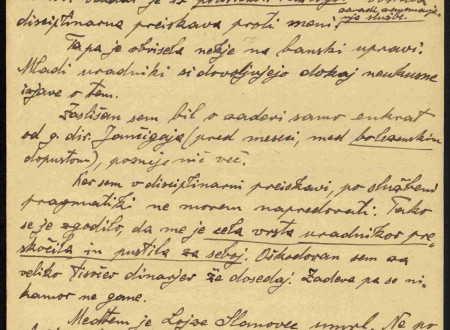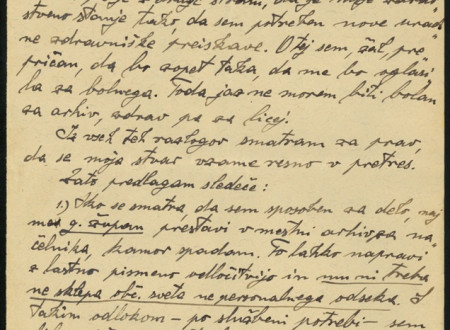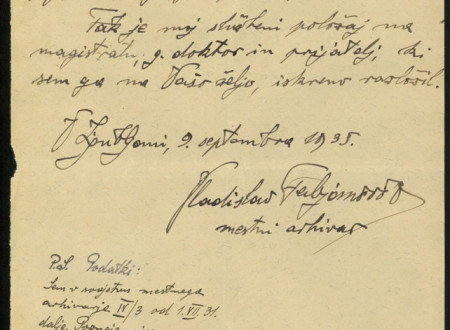The City Archivist Vladislav Fabjančič at Life's Crossroads
Everything is Politics
The request written by the city archivist Vladislav Fabjančič in September 1935 and addressed to the Ljubljana mayor Vladimir Ravnihar is interesting in two regards. Firstly, it is a story of Fabjančič's work – he himself calls it »a matter of a city archivist«, which far surpasses the faith of any ordinary city clerk. His dealing with issues ever since the start of his employment in 1923, but particularly the complications he needed to face up to after the year 1933, dictate his distinctly personal tone of record, which an ordinary reader may find appealing, but researchers need to critically review.
The role of the city archivist at the time – managing and at the same time carrying out archival service – allows us to view the publishing of this month’s archivalia as a small contribution to the research of the history of the archive under the Ljubljana city administration or the Ljubljana Historical Archive as it is called today. There are relatively few documents preserved from the 1930s, when the city archivist worked within the Cultural department, whereas documents dating from the later period are much more common.
Information about the crossroads of life stated by Vladimir Fabjančič (1894-1950) in his request, confirm the facts that we know about him. They can be summarized in the description of his employment, which we can divide into two parts. The first one is the time from his landing the job in 1923 until 1933, and the second one is the time of his re-employment in 1936 until his retirement in 1950. From 1933 to 1935 the position of the city archivist was occupied by Lojze Slanovec, a typesetter by profession, who, like Vladislav Fabjančič, was also a politician and a journalist. Prior to Fabjančič, the position of the Ljubljana city archivist was held by two poets; from 1898 to 1912 it was Anton Aškerc, whom Slovenian archivists consider to be the first Slovenian professional archivist due to his dedication to the profession and after whom Slovenian archival award is now named, and the other was Oton Župančič, who held the position between 1913 and 1922, and, unlike his predecessor, viewed his work merely as a means of income.
Politics and journalism were Frabjančič’s first choice, and he devoted himself to these two fields wholeheartedly ever since finishing his grammar school. He was a left-wing politician, a follower of the revivalist movement Preporod and a communist, one of the founding members of the communist party in Slovenia in April 1920, and an editor of the party newspaper Rdeči prapor. However, due to his moderate view on the work of the party, he was expelled from it in 1923. Throughout the years up until 1936, when he completely gave up politics, his job efficiency was affected by his active participation in politics. With the permission of his superiors, he even covered his longer absences from work with unpaid leave. Still, in 1929 he participated in the preparation of a historical exhibition to commemorate the 120th anniversary of the Illyrian Provinces and was for his work awarded the the silver Ordre des Palmes académiques by the French authorities.
Hostilities between representatives of the Slovenian left-wing and right-wing politicians were a common occurrence and so were favours that followers on both sides received from their respective political parties. It is in this context that we can probably view the appointment of Fabjančič as the city archivist in 1923 – namely, at the time the majority in the Ljubljana municipal council was held by the political left, and the mayor was a socialist Ljudevit Perič.
In 1930s the situation at the Ljubljana Town Hall slowly deteriorated for Vladislav Fabjančič. In 1933, following a longer absence from work due to his political activity, Fabjančič became the secretary of the presidency of Ljubljana municipality, only to be removed from that post in 1934 because of his participation in the Bojevnik mass movement. He was relocated to the teachers’ library at the Ljubljana lyceum for girls and his political opponents also conducted a disciplinary investigation against him. His health deteriorated as well, a result of health condition he developed in his youth as a volunteer in the battle of Cer in August 1914. Fabjančič even thought about retirement. In distress, he turned to the Ljubljana mayor Vladimir Ravnihar, who in 1923 was one of the municipal councillors that strongly opposed Fabjančič’s appointment as city archivist. We cannot tell for sure how much support he received from Ravnihar since the latter was within less than a year removed from his position as mayor due to political circumstances.
In any case, his re-employment as the city archivist in 1936 enabled Vladislav Fabjančič to enter a creative professional period, which lasted up until his retirement in 1950. He was a prolific writer, whose work on the Ljubljana judges and mayors and on residents and houses in Ljubljana is still of interest to researchers and is published and frequently consulted even today.
Marija Grabnar


